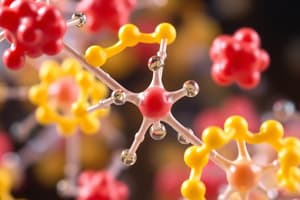Podcast
Questions and Answers
What are enzymes?
What are enzymes?
- Molecules that slow down biological reactions
- Proteinic molecules that speed up biological reactions (correct)
- Substrates that form the active site
- Cofactors that increase the energy barrier for reactions
What is the compound on which an enzyme acts known as?
What is the compound on which an enzyme acts known as?
- Apoenzyme
- Holoenzyme
- Product
- Substrate (correct)
What is a holoenzyme?
What is a holoenzyme?
- A complete, functional enzyme consisting of an apoenzyme and a cofactor (correct)
- A type of substrate-specific enzyme
- An enzyme that does not require cofactors for catalytic activity
- An inactive form of an enzyme
Where does the catalysis occur in enzymes?
Where does the catalysis occur in enzymes?
What does the activation energy represent?
What does the activation energy represent?
Which type of cofactors are small organic molecules?
Which type of cofactors are small organic molecules?
What is the most common type of cofactor?
What is the most common type of cofactor?
What is the main function of metal-activated enzymes?
What is the main function of metal-activated enzymes?
Which model of enzyme binding states that the active site is complementary in shape to the substrate and does not change at all?
Which model of enzyme binding states that the active site is complementary in shape to the substrate and does not change at all?
What type of specificity does the enzyme exhibit if it acts on a particular steric or optical isomer?
What type of specificity does the enzyme exhibit if it acts on a particular steric or optical isomer?
Flashcards are hidden until you start studying




